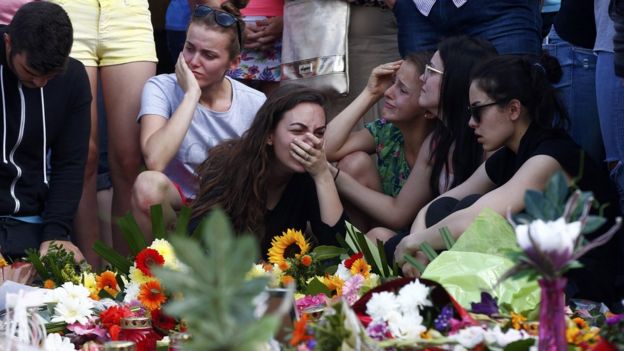Germany in new anti-terror plan to thwart Islamist militants
http://www.bbc.com/news/world-europe-37044519
Interior Minister Thomas de Maiziere also announced plans to speed up the deportation of foreign criminals.
He announced extra personnel, equipment and surveillance powers for the police.
But he rejected banning the public wearing of the burka (the Islamic full veil). And he resisted pressure to ease medical confidentiality.
Some of his conservative Christian Democrat (CDU) colleagues have urged a burka ban but Mr de Maiziere said it would be "problematic" and "you cannot ban everything that you reject".
Mr de Maiziere was responding to recent attacks linked to militant Islamists. Two terror attacks by Islamist migrants shocked Germany last month - in Wuerzburg and Ansbach.
Citizenship debate
"I propose that German citizens who are fighting with terror militias in other countries, and take part in combat operations there, if they have a second nationality - and only then - they would lose German citizenship," he told a news conference.
There was a move in France recently to deprive jihadists of their French citizenship, but it did not get through parliament.
German media report that the centre-left Social Democrats (SPD) - the CDU's coalition partners - strongly oppose any general ban on dual citizenship. The Greens are also against the idea.
 Image copyright Reuters
Image copyright Reuters "My proposals are limited to the points that can lead to more security rapidly," Mr de Maiziere said.
One of the new measures is to make "promoting terrorism" a criminal offence.
On deportation, Mr de Maiziere said there would be no tolerance of foreign offenders who used false identities in order to stay in Germany.
Key election issue - the BBC's Jenny Hill in Berlin writes:
Germany hasn't experienced a major coordinated terror attack on the scale of Paris or Brussels - yet.
A senior intelligence source has told the BBC that his agents are investigating hundreds of reports that Islamic State (IS) has sent so-called hit squads into the country, disguised as refugees, and that the risk of such an attack is very high.
Political reaction to that threat will dominate campaigning ahead of next year's general election. Already it has ignited a fierce debate, which extends well beyond domestic security.
Some of Mr de Maiziere's fellow conservatives - who are losing votes to right-wing populists - want him to ban burkas and outlaw dual citizenship altogether.
Why is doctors' confidentiality an issue?
The duty of doctors to respect patient confidentiality is enshrined in the German constitution. And German privacy laws are very strict.
But Mr de Maiziere said he would meet senior doctors to discuss how they could more easily tip off police when they suspected a patient was a terror risk.
In three major cases the perpetrators were found to have been mentally unstable:
- The Ansbach bomber who killed himself and wounded 15 others at a music festival last month
- The gunman who killed nine people in a Munich shopping mall - also last month
- The Germanwings pilot who deliberately crashed an airliner in the French Alps in 2015
German doctors who breach patient confidentiality can face up to a year in prison or be forced to pay a fine.
Frank Ulrich Montgomery, the head of the German Medical Association, said: "Patient confidentiality protects patients' privacy and is a basic right under the constitution."
Comments are closed.
